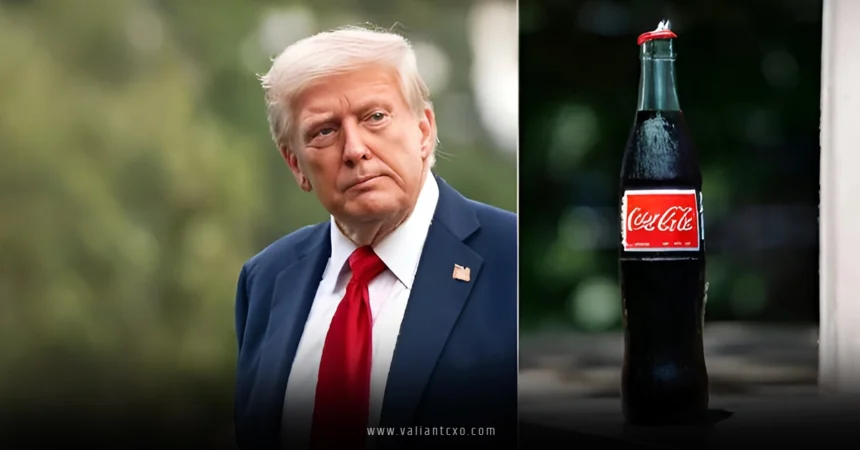In July 2025, President Donald Trump sparked a nationwide conversation by announcing on Truth Social that Coca-Cola had agreed to switch from high-fructose corn syrup (HFCS) to cane sugar in its U.S. beverages. This claim, tied to the “Make America Healthy Again” (MAHA) initiative led by Health Secretary Robert F. Kennedy Jr., has stirred excitement, skepticism, and debate. While Coca-Cola later confirmed plans to launch a new cane sugar-sweetened Coke in fall 2025, the company has not fully replaced HFCS in its flagship product. Here’s everything U.S. consumers need to know about this development, its implications, and what to expect.
Trump’s Announcement and Coca-Cola’s Response
On July 16, 2025, Trump posted on Truth Social: “I have been speaking to Coca-Cola about using REAL Cane Sugar in Coke in the United States, and they have agreed to do so. I’d like to thank all of those in authority at Coca-Cola. This will be a very good move by them — You’ll see. It’s just better!”. This announcement aligned with the MAHA movement’s push to reduce processed ingredients like HFCS, which Kennedy has linked to obesity and chronic illnesses.newsweek.comabcnews.go.comtime.com
Coca-Cola initially responded cautiously, neither confirming nor denying the switch but stating, “We appreciate President Trump’s enthusiasm for our iconic Coca-Cola brand. More details on new innovative offerings within our Coca-Cola product range will be shared soon”. On July 22, during its quarterly earnings report, Coca-Cola CEO James Quincey clarified that the company would launch a new U.S. cane sugar-sweetened Coke in fall 2025 as an addition to its portfolio, not a replacement for the HFCS-sweetened flagship product. Quincey noted that cane sugar is already used in other U.S. products like lemonade and teas, and the new offering aims to meet consumer preferences for varied sweetener options.newsweek.comnbcnews.comnpr.org
Why Cane Sugar? The MAHA Connection
The push for cane sugar stems from the MAHA initiative, which critiques HFCS as a contributor to health issues like obesity and diabetes. Kennedy has called HFCS “a formula for making you obese and diabetic”, though nutritional experts argue that cane sugar and HFCS have similar metabolic effects, both being about 50% fructose and 50% glucose. Dr. Dariush Mozaffarian, a cardiologist at Tufts University, noted that both sweeteners can raise risks for obesity, diabetes, and high blood pressure when consumed excessively, making the health benefits of switching unclear.abcnews.go.comnbcnews.comcnn.com
Despite the lack of significant nutritional differences, some consumers prefer cane sugar for its taste, as seen in the popularity of Mexican Coke, which is sweetened with cane sugar and sold in glass bottles at a premium in the U.S.. Trump’s advocacy, combined with his well-documented love for Diet Coke (sweetened with aspartame, not HFCS), has fueled speculation that the move is as much about economic and cultural appeal as health.

Economic and Industry Impacts
The proposed shift has significant economic implications, particularly for the U.S. corn and sugar industries:
- Corn Industry Concerns: The Corn Refiners Association warned that replacing HFCS with cane sugar could cost thousands of U.S. jobs, depress farm income, and increase reliance on imported sugar, with no clear nutritional benefit. An analysis by Reflexivity estimated a $1.2 billion annual revenue loss for the corn industry and a $600 million increase in Coca-Cola’s sweetener costs. Shares of HFCS producer Archer-Daniels-Midland fell slightly after Trump’s announcement.newsweek.comaxios.comaxios.com
- Sugar Industry Boost: Florida, the top U.S. sugarcane producer and Trump’s home state, could benefit from increased demand for domestic cane sugar. However, U.S. sugar prices are roughly double the global market due to trade barriers, which could raise production costs for Coca-Cola.reuters.comnpr.org
- Small Business Impact: Sellers of Mexican Coke, like Ivan Vasquez of Oaxacan-style restaurants in California, worry that a U.S. cane sugar Coke could erode their niche market, as Mexican Coke’s distinct flavor and glass bottle appeal drive its premium pricing.nytimes.com
Will It Taste Better? Consumer and Cultural Perspectives
Many Americans associate cane sugar-sweetened Coke, like Mexican Coke, with a crisper, less syrupy taste, though experts debate whether the difference is significant. Dr. Mozaffarian, a cane sugar fan, noted that reducing overall sweetness is more critical than the sweetener type. However, cultural sentiments vary. Some Mexican-American communities, as noted by food writer Memo Torres, may resist U.S.-made cane sugar Coke due to its association with Trump’s policies, including immigration raids, with sentiments like “Trump wants our flavors but not our people”.nytimes.comnbcnews.comnbcnews.com
Coca-Cola already offers cane sugar-sweetened products in the U.S., such as Kosher-for-Passover Coke (marked with yellow caps) and limited “local tastes” flavors like Georgia Peach. The new cane sugar Coke, set to launch in fall 2025, will complement these offerings, giving consumers more choices without altering the classic HFCS recipe.abcnews.go.comtime.comcnn.com
What This Means for You
- Availability: Expect a new cane sugar-sweetened Coca-Cola in U.S. stores by fall 2025, likely sold alongside the traditional HFCS version. It may resemble Mexican Coke in flavor but will use U.S. cane sugar, potentially at a higher price due to domestic sugar costs.npr.orgcnn.com
- Health Impact: Don’t expect significant health benefits, as both HFCS and cane sugar pose similar risks when consumed in excess. Experts recommend limiting soda intake overall.nbcnews.comabcnews.go.com
- Economic Considerations: The switch could increase soda prices due to higher cane sugar costs, while impacting corn farmers and potentially boosting Florida’s sugar industry.axios.comnpr.org
- Check Official Sources: For updates, visit Coca-Cola’s official website or follow the company’s announcements. To learn more about MAHA’s goals, check HHS.gov for policy updates.
How to Stay Informed and Avoid Misinformation
Trump’s announcement sparked a flurry of social media reactions, with some praising the move as a MAHA victory and others criticizing it as a distraction from issues like the Jeffrey Epstein controversy. The Corn Refiners Association and farmers expressed concerns about job losses, highlighting tensions between health advocacy and agricultural interests. Always verify claims through trusted sources like:
- IRS.gov for any related tax or SNAP policy changes.reuters.com
- Coca-Cola’s Newsroom for product updates.
- USDA.gov for information on sugar and corn industry impacts.
Avoid falling for unverified social media claims about recipe changes or health benefits, as misinformation can spread quickly.
Conclusion
President Trump’s push for Coca-Cola to use cane sugar has led to a confirmed new product launch in fall 2025, but it’s not a full switch from HFCS. While the move aligns with MAHA’s health goals, experts question its nutritional impact, and economic concerns loom for corn farmers. For U.S. consumers, this means more soda options but potentially higher prices and no major health benefits. Stay tuned to official Coca-Cola announcements and trusted sources for the latest on this fizzy development. Want to know more about how this affects your favorite soda? Check Coca-Cola’s updates and share your thoughts!
Similar Article :valiantcxo.com


